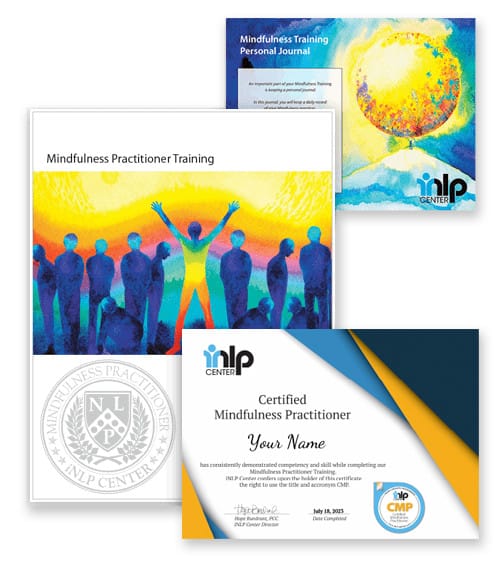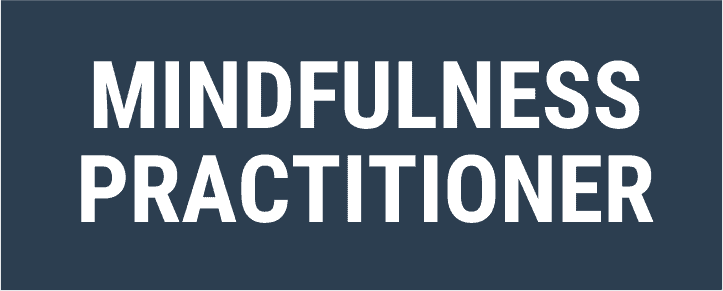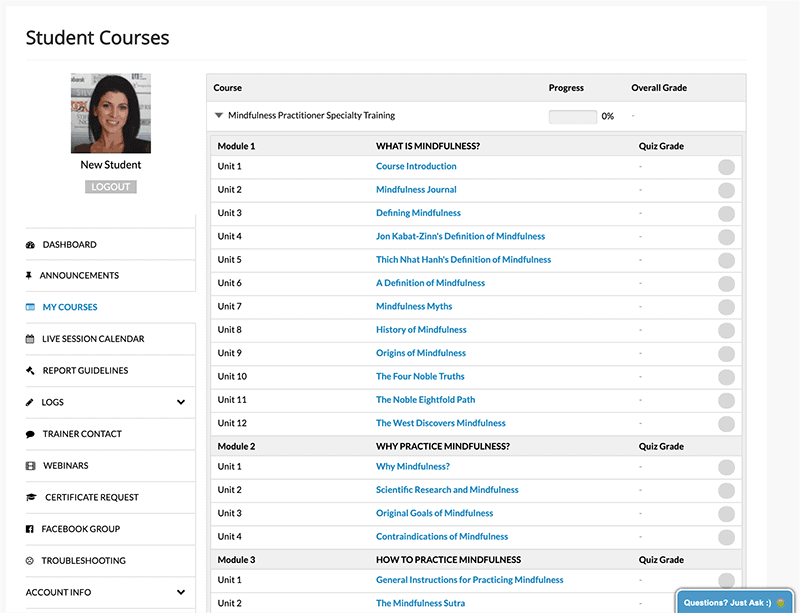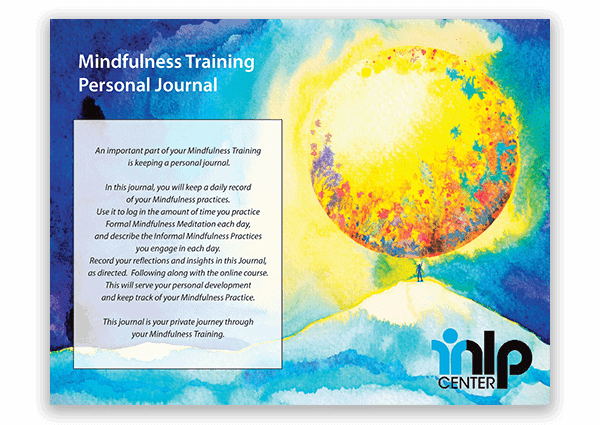Start Your Mindfulness Certification Training Today!
iNLP Center’s Mindfulness Training at a glance:
- 100% accredited interactive mindfulness certification training delivered through a state-of-the-art online platform
- 13 module mindfulness course including Audios, Videos, Exercises, and Journal assignments
- Downloadable 44-page Mindfulness Journal
- Work entirely online – no travel required
- Includes weekly live mindfulness training sessions in our online classroom with a Certified Mindfulness Training Instructor
- Practice and learn at your own pace with trainer support along the way
- 24/7 access to your mindfulness learning material
- Expert support when you need it via email, online chat, phone, and online classrooms
- Private, student-only community to meet others, practice, and grow
- Simple, intuitive online learning platform makes it easy to study
- Verifiable Mindfulness Digital Badge and Certificate included
Mindfulness Training for Individuals and Coaches.
Mindfulness is an ancient wellness practice that has been backed by modern science.
This mindfulness course will teach you the basics of mindfulness, from its definition and history to its benefits and how to practice it. You will learn about the four foundations of mindfulness, including mindfulness of the body, feelings, mind, and objects of the mind. You will also learn about walking meditation, informal mindfulness practices, mindfulness and NLP, mindfulness and the perception of time, and ego and the notion of self. By the end of the course, you will be familiar with the basics of mindfulness and be able to incorporate it into your daily life.
Here are some additional details about each module:
Module 1 defines mindfulness and summarizes its rich history, which spans 2600 years. You will learn about ancient and modern definitions of mindfulness, as well as why it has become a mainstream stress management and wellness practice.
Module 2 discusses the benefits of mindfulness according to modern science and according to the classic mindfulness text, The Discourse on the Four Foundations of Mindfulness. You will learn how mindfulness can help you reduce stress, improve your mood, and increase your focus and concentration.
Module 3 covers the how-to aspects of mindfulness. You will learn about formal and informal ways to practice mindfulness, as well as how to address your thinking mind while practicing mindfulness.
Modules 4-7 explore the four foundations of mindfulness: the body, feelings, mind, and objects of the mind. You will learn how to be mindful of your breath, your body sensations, your thoughts and emotions, and the world around you.
Modules 8-12 offer more advanced mindfulness practices, such as walking meditation, informal mindfulness practices, mindfulness and NLP, mindfulness and the perception of time, and ego and the notion of self.
By the end of this course, you will have a solid understanding of mindfulness and how to practice it. You will be able to use mindfulness to improve your health, well-being, and quality of life.
You can enroll in this training at anytime and complete it at your own speed. The coursework is self-paced and also include weekly live Zoom sessions you can attend throughout, and even after you have completed the course. The live sessions give you the added value of learning from a professional mindfulness coach where you can ask questions, practice mindfulness techniques, and connect with other students.
You will be required to attend at least 8 online mindfulness training sessions. They are held in our Zoom classrooms with your mindfulness instructor, Fabiola Giraldo, where you have the opportunity to get personalized, expert training in a small-group environment.
Choose a Mindfulness Training Option:
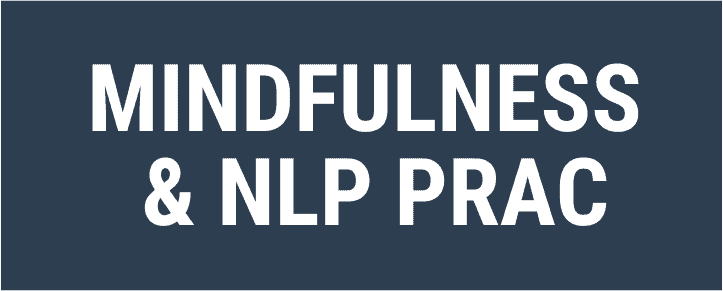 |
Includes These Courses:   |
| You’ll Receive: 2 Certificates & Digital Badges NLP Practitioner Mindfulness Practitioner plus 20 ICF Resource Development Hrs |
| Available each week: 10 Live Training Sessions |
| Earn Unlimited: Reciprocal Coaching Hours |
 |
| Or, Installment Plan Price: $315/month x 3 months Enroll Now (Total installment payments=$945) |
 |
Includes These Courses:    |
| You’ll Receive: 3 Certificates & Digital Badges NLP Practitioner Hypnosis Practitioner Mindfulness Practitioner plus 40 ICF Resource Development Hrs |
| Available each week: 10 Live Training Sessions |
| Earn Unlimited: Reciprocal Coaching Hours |
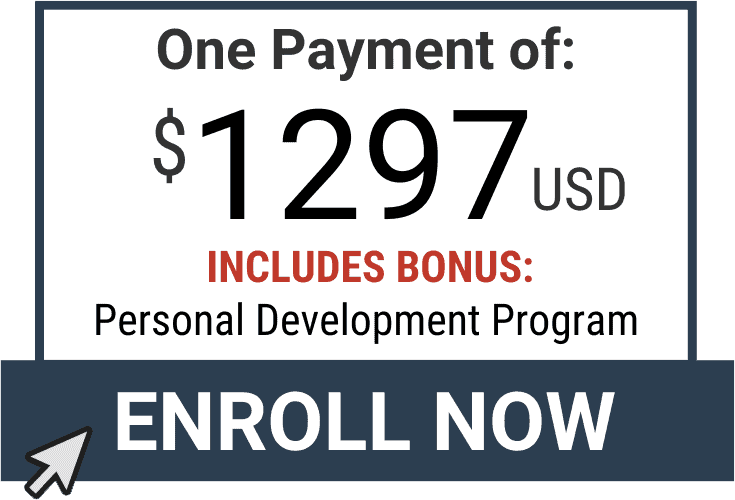 |
| Or, Installment Plan Price: $340/month x 4 months Enroll Now (Total Installment payments=$1360) |
This course may be bundled with other programs for a discounted rate. Please inquire for more information.
What your Mindfulness Certification Training Includes
Once enrolled you will have access to your Student Dashboard and tools to start your course.
Elements of the Mindfulness Training Course:
Assignments
Assignments are an integral part of your training. Receiving your certification is conditional upon your successful completion (80% grade or better) of all assignments. Some assignments may ask you to work with a volunteer of your choice. This can be a friend, family member, co-worker, or an actual client. Other assignments may ask you to complete a writing assignment or answer a question or to record yourself on audio. In lieu of recording, you may attend live training sessions to demonstrate your new skills with your trainer.
Audios
Throughout your mindfulness training, you will have several guided meditation to listen to and follow.
Live Mindfulness Training Sessions
In addition to the self-paced online mindfulness certification course material, you will also be learning during your live training sessions. These live sessions take place in our Zoom classroom between you, your trainer, and a small group of students. You are required to attend at least eight, but also able to attend as many as you like.
These sessions are an opportunity for you to learn more about each topic covered in this course, practice your skills, see and participate in live demonstrations, and ask questions. It is highly recommended to attend as many live training sessions as possible to get the most from this training and develop your skills as an effective mindfulness practitioner and coach. Directions for attending are located in the first module of this course.
Journaling
An important part of your training is keeping a daily mindfulness journal. We provide a 44-page downloadable journal where you can keep your thoughts throughout your course as well as respond to course journal prompt.
Upon successful completion of this course, you may request your mindfulness certificate in the last unit.
Anytime you need help we are here for you. You can click on the “Questions?” chat box at the bottom right of the screen, email your trainer, or call us.
iNLP Center’s Mindfulness Certification & Training Modules:

Module 1: What is Mindfulness?
This module defines mindfulness and summarizes its rich history which spans 2600 years.
After completing this module, you will be familiar with ancient and modern definitions of mindfulness- an ancient wellness practice backed by modern science.
Module 1 |
WHAT IS MINDFULNESS? |
|
|---|---|---|
Unit 1 |
Course Introduction |
|
Unit 2 |
Live Session Classroom Access |
|
Unit 3 |
Mindfulness Journal |
|
Unit 4 |
Defining Mindfulness |
|
Unit 5 |
Jon Kabat-Zinn's Definition of Mindfulness |
|
Unit 6 |
Thich Nhat Hanh's Definition of Mindfulness |
|
Unit 7 |
A Definition of Mindfulness |
|
Unit 8 |
Mindfulness Myths |
|
Unit 9 |
History of Mindfulness |
|
Unit 10 |
Origins of Mindfulness |
|
Unit 11 |
The Four Noble Truths |
|
Unit 12 |
The Noble Eightfold Path |
|
Unit 13 |
The West Discovers Mindfulness |

Module 2: Why Practice Mindfulness?
This module discusses the benefits of mindfulness according to modern science and according to the classic mindfulness text: The discourse on the Four Foundations of Mindfulness.
You will learn why mindfulness has become a mainstream stress management and wellness practice.
Module 2 |
WHY PRACTICE MINDFULNESS? |
|
|---|---|---|
Unit 1 |
Why Mindfulness? |
|
Unit 2 |
Scientific Research and Mindfulness |
|
Unit 3 |
Original Goals of Mindfulness |
|
Unit 4 |
Contraindications of Mindfulness |

Module 3: How to Practice Mindfulness
This module covers the how-to aspects of mindfulness. You will learn about formal and informal ways to practice mindfulness and how to address your thinking mind while practicing mindfulness.
Module 3 |
HOW TO PRACTICE MINDFULNESS |
|
|---|---|---|
Unit 1 |
General Instructions for Practicing Mindfulness |
|
Unit 2 |
The Mindfulness Sutra |
|
Unit 3 |
Formal and Informal Mindfulness |
|
Unit 4 |
Inner and Outer Stimulus |
|
Unit 5 |
Working with Mind Wandering |
|
Unit 6 |
Time |

Module 4: Mindfulness of the Body
This module covers an in-depth exploration of the First Foundation of Mindfulness: the breathing body and all its parts, functions and actions.
Module 4 |
MINDFULNESS OF THE BODY |
|
|---|---|---|
Unit 1 |
The First Foundation of Mindfulness |
|
Unit 2 |
Mindfulness of Breathing |
|
Unit 3 |
Guided Meditation- Breathing |
|
Unit 4 |
Guided Meditation Breathing Exercise |
|
Unit 5 |
Beyond Mindfulness of Breathing |
|
Unit 6 |
Mindfulness of the Positions of the Body |
|
Unit 7 |
Mindfulness of the Actions of the Body |
|
Unit 8 |
Mindfulness of the Parts that Make Up the Body |
|
Unit 9 |
Guided Meditation- Body Scan |
|
Unit 10 |
Mindful Body Scan Exercise |
|
Unit 11 |
Mindfulness of the Elements in the Body |
|
Unit 12 |
Mindfulness of the Impermanence of the Body |

Module 5: Mindfulness of Feelings
This module explores the Second Foundation of Mindfulness: the realm of pleasant, neutral and unpleasant sensations as perceived by the body-mind system.
Module 5 |
MINDFULNESS OF FEELINGS |
|
|---|---|---|
Unit 1 |
Feelings |
|
Unit 2 |
Types of Feelings |
|
Unit 3 |
The Life Span of a Feeling |
|
Unit 4 |
Feeling Calm |
|
Unit 5 |
Becoming Mindful of Different Feelings |
|
Unit 6 |
Instructions for Practicing Mindfulness of Feelings |
|
Unit 7 |
Guided Meditation- Feelings |
|
Unit 8 |
Mindfulness of Feelings Exercise |
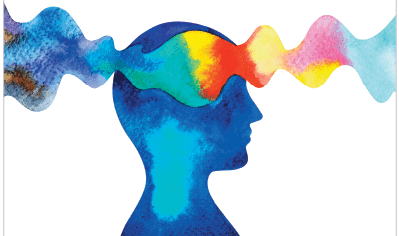
Module 6: Mindfulness of the Mind
This module discusses the Third Foundation of Mindfulness: the mental and emotional experiences produced and perceived by the psyche.
Module 6 |
MINDFULNESS OF THE MIND |
|
|---|---|---|
Unit 1 |
The Mind |
|
Unit 2 |
Mental and Emotional States |
|
Unit 3 |
Identifying States of Mind |
|
Unit 4 |
Instructions for Practicing Mindfulness of the Mind |
|
Unit 5 |
Guided Meditation - The Mind |
|
Unit 6 |
Guided Meditation - The Mind - Exercise |

Module 7: Mindfulness of the Objects of the Mind
This module covers the Fourth Foundation of Mindfulness: the world as perceived by the five senses and the ability to think and become aware of our thinking processes.
Module 7 |
MINDFULNESS OF THE OBJECTS OF THE MIND |
|
|---|---|---|
Unit 1 |
Objects of the Mind |
|
Unit 2 |
Types of Objects |
|
Unit 3 |
Instructions for Mindfulness of the Objects of the Mind |
|
Unit 4 |
Guided Meditation-Mindfulness |
|
Unit 5 |
Guided Meditation Objects of the Mind Exercise |

Module 8: Walking Meditation
This module explores the how-to aspects of a form of moving mindfulness- walking meditation. This form of meditation uses movement as a way to access mindfulness.
Module 8 |
WALKING MEDITATION |
|
|---|---|---|
Unit 1 |
Walking Mindfulness |
|
Unit 2 |
Instructions |
|
Unit 3 |
Pace and Speed |
|
Unit 4 |
Walking Meditation Exercise |

Module 9: Informal Mindfulness Practices
Here you will learn about embracing a mindful attitude in any situation, particularly while carrying out daily actions such as eating and being with others.
Module 9 |
INFORMAL MINDFULNESS PRACTICES |
|
|---|---|---|
Unit 1 |
An Informal Structure |
|
Unit 2 |
Activity Based Mindfulness |
|
Unit 3 |
Mindful Pauses |
|
Unit 4 |
Mindful Breathing Pauses |
|
Unit 5 |
Mindful Posture Pauses |
|
Unit 6 |
Mindful Action Pauses |
|
Unit 7 |
Mindful Eating |
|
Unit 8 |
Mindful Eating Exercise |
|
Unit 9 |
Mindfulness Here and Now |

Module 10: Mindfulness and NLP
Step by step instructions are offered so that you can deepen your mindfulness throughout the day via your 5 senses and your ability to become aware of yourself at any moment.
Module 10 |
MINDFULNESS AND NLP |
|
|---|---|---|
Unit 1 |
Information Processing |
|
Unit 2 |
Mindful Listening |
|
Unit 3 |
Mindful Listening Exercise |
|
Unit 4 |
VAK Mindfulness |
|
Unit 5 |
Kinesthetic Mindfulness |
|
Unit 6 |
Visual Mindfulness |
|
Unit 7 |
Auditory Mindfulness |

Module 11: Mindfulness and the Perception of Time
This module explores the ways in which one can become mindful of their perception of time and how its commonly distorted depending on our mental state. Mindful exercises are offered.
Module 11 |
MINDFULNESS AND THE PERCEPTION OF TIME |
|
|---|---|---|
Unit 1 |
Mindfulness and Time |
|
Unit 2 |
Inner and Outer Time |
|
Unit 3 |
The Stress-Time Continuum |
|
Unit 4 |
Working with Time |

Module 12: Ego and the Notion of Self
This module offers practical insights into the use of mindfulness for self-exploration, self-understanding and self-liberation. Mindful exercises are offered.
Module 12 |
MINDFULNESS AND NLP |
|
|---|---|---|
Unit 1 |
Information Processing |
|
Unit 2 |
Mindful Listening |
|
Unit 3 |
Mindful Listening Exercise |
|
Unit 4 |
VAK Mindfulness |
|
Unit 5 |
Kinesthetic Mindfulness |
|
Unit 6 |
Visual Mindfulness |
|
Unit 7 |
Auditory Mindfulness |

Module 13: Final Assignments
The module is your final certification module. It is only for journal entry and to practice and submit your mindfulness demonstration submission.
Module 13 |
EGO AND THE NOTION OF SELF |
|
|---|---|---|
Unit 1 |
Ego Stories vs. Mindfulness |
|
Unit 2 |
Two Kinds of Ego Stories |
|
Unit 3 |
Moving Beyond Ego Stories |
|
Unit 4 |
The History of Spoons |
|
Unit 5 |
Outcomes of the Spoon Phenomenon |
Helpful Questions about Mindfulness Training
Mindfulness is often referred to as a practice, and what we practice has to do with paying attention to our moment-to-moment experience with openness, curiosity and care.
The first step in training your mind to access the state of mindfulness is to know what being mindful really means. Next step is to be mindful as often as possible. The more you practice accessing the state of mindfulness, the easier it will become over time.
As with other skills, practice makes perfect. So, in order to develop your mindfulness skills, you first need to know what is mindfulness and then you need to know how to engage in mindful activities.
Mindfulness activities can be divided into 2 categories: formal mindfulness (periods of quiet sitting mindfulness meditation) and informal mindfulness (engaging in regular activities, such as eating or exercising, but in a very conscious and mindful way.
To learn about mindfulness and its benefits, we need to practice it on a daily basis.
A one-time experience or occasional practice is not enough in terms of mental training.
Most mindfulness training programs last at least eight weeks. That period of time makes it easier for newcomers to mindfulness to develop new habits as they train in formal and informal mindfulness, and to experience the benefits that come with regular practice.
At the iNLP Center we offer well rounded Mindfulness Training which covers both the theoretical and practical aspects of mindfulness. Our course consists of written material that covers historical, scientific and practical information about mindfulness, guided mindfulness meditations to support your practice, and unlimited live sessions with a qualified Mindfulness Trainer who is there to support you as you develop your own mindfulness skills. Our course is self-paced, and we ask that you attend at least eight live classes in order to help you develop the habit of taking time to practice mindfulness. Your trainer is there to answer questions you may have about the theoretical and experiential aspects of mindfulness.
Any activity can be done with mindful awareness. That is part of the beauty of mindfulness, it can be applied to all areas of life, from eating to gardening to listening to a friend.
A well-known mindfulness exercise is mindful eating. Mindful eating is best done when eating alone or when eating with others who are also going to practice mindful eating since it involves eating quietly.
When eating in such way, we slow down to really focus on the activity of eating, which also includes seeing, smelling, tasting and even listening to the foods we are eating. Savoring the food and experiencing it in a more conscious way with body and mind.
Mindful eating is the opposite of eating while multitasking or zoning away while munching and watching TV. Mindful eating about being fully present with our meal and noticing every sensory aspect related to it. Some people experience gratitude when eating in this way, and most report feeling fuller faster.
The Body Scan, a guided meditation which involves sensing the body from head to toe is another mindfulness exercise. It helps us become more aware of our body and its many parts, and by doing so we become more present and more in tune with our bodies.
Perhaps the most common mindfulness exercise is Mindful Breathing. This means paying full attention to our breath, not by controlling it, but by noticing it, by paying attention to each inhalation and exhalation, by feeling our belly expanding and compressing with each breath, and by learning to keep our attention there, at the core of our very physical existence.
Our Mindfulness Practitioner Course teaches you how to practice mindfulness in different scenarios and offers guided mindfulness meditations and exercises.
The most important qualification you must have in order to teach mindfulness is that you yourself have experienced and practiced mindfulness on a daily basis for some time and that you are familiar with the history, benefits, practices, challenges and benefits of mindfulness. Once you have experienced the benefits of mindfulness practice in your own mind and life, it will be much easier to explain mindfulness to others.
Aside from having a regular personal daily mindfulness practice that you have maintained for some time (months or ideally years), it is important that you know about the history of this ancient practice, which is at least 2600 years old. While mindfulness has gained popularity as a stress management tool in modern times, it is certainly not a panacea and people with certain mental health conditions need to approach it with some caution since it increases introspection and awareness of the inner mental life. Therefore, in order to teach mindfulness, a mindfulness practitioner must know about the contraindications of mindfulness.
Our Mindfulness Practitioner Certification Course covers the history, science and applications of mindfulness and it is taught by a Mindfulness Trainer who has been studying and practicing mindfulness for over 15 years and holds a Certificate in Mindfulness and Psychotherapy from the Institute for Meditation and Psychotherapy in Cambridge, Massachusetts, USA. Our course is comprehensive and it is meant to give you a complete and well-rounded introduction to mindfulness.
Our Mindfulness Practitioner Certification is not an official mindfulness teacher training course per se (those tend to be longer). Our course was developed to introduce anyone into the world of mindfulness and offer them a solid foundation from which to grow and develop a life-long mindfulness journey, and to teach mindfulness to life coaches and others who work with clients in the personal development world since mindfulness helps improve listening skills and the capacity to be more empathic.
However, because we ask that you come to at least eight live weekly sessions and that you practice mindfulness on a daily basis while you study with us, our course supports your evolution as a mindfulness practitioner. If you follow our recommendations for at least eight weeks and you keep practicing mindfulness after you complete it, it will give you the experience, confidence and information you need to teach mindfulness to others if you wish to do so. Many of our graduates (who tend to be coaches, counselors or teachers) feel confident enough to teach mindfulness to their clients and students by the time they complete their certification.



